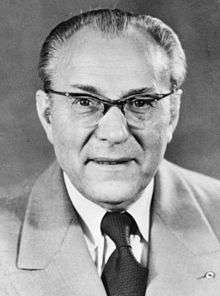Otto Grotewohl
| Otto Grotewohl | |
|---|---|
 | |
| Prime Minister of the German Democratic Republic (East Germany) | |
|
In office 12 October 1949 – 21 September 1964 | |
| President |
Wilhelm Pieck Walter Ulbricht |
| Preceded by |
None Lutz Graf Schwerin von Krosigk, as last Head of Government of Nazi Germany |
| Succeeded by | Willi Stoph |
| Personal details | |
| Born |
11 March 1894 Braunschweig, Duchy of Brunswick, German Empire |
| Died |
21 September 1964 (aged 70) East Berlin, East Germany |
| Nationality | German |
| Political party | USPD, SPD, SED |
| Spouse(s) | Marie Martha Louise |
| Children | 2 |
| Profession | Printer, politician |
Otto Grotewohl (German pronunciation: [ˈɔtoː ˈɡʁoːtəvoːl]; 11 March 1894 – 21 September 1964) was a German politician and the first prime minister of the German Democratic Republic from 1949 until his death in 1964.
Biography
Grotewohl was born in the city of Braunschweig (which would be part of West Germany during the partition) on 11 March 1894 and his father was a master tailor.[1] Following World War I started his political career as a leader of the Independent Social Democratic Party of Germany (USPD) and minister in the Free State of Brunswick. In 1922 Grotewohl with the majority of the USPD members joined the Social Democratic Party of Germany (SPD) and from 1925 was a member of the Reichstag parliament. Dismissed after the Nazi Machtergreifung in 1933 he was imprisoned several times.

After World War II he became a leader of the SPD in the Soviet occupation zone of Germany and, fiercely opposed by chairman Kurt Schumacher, led his party into a merger with the Communist Party under Wilhelm Pieck. Grotewohl, after initial hesitation, yielded to the pressure by the Soviet Military Administration and Walter Ulbricht and in April 1946 together with Pieck formed the new Socialist Unity Party (SED).
Prime minister
With the establishment of the German Democratic Republic (GDR) on 7 October 1949, Grotewohl became the GDR's first prime minister (Ministerpräsident), while Wilhelm Pieck served as state president. With the creation of the Council of Ministers (Ministerrat) government of the GDR in 1950 Grotewohl, as Ministerpräsident, became its first chairman. The actual power holder however was Walter Ulbricht, General Secretary of the governing SED Central Committee from 1950 on.
_1974%2C_MiNr_1912.jpg)
Grotewohl retained the perspective of a left-wing social democrat within the SED. In a major speech to an SED party conference on 28 March 1956, Grotewohl condemned abuses in the legal system. He denounced illegal arrests, called for more respect for civil rights, and even asked the parliament to develop lively debate. He also made a veiled criticism of Justice Minister Hilde Benjamin's notoriously heavy-handed handling of political trials. He retained his posts due to the Kremlin's trust in him.
In 1960 he was diagnosed with leukemia, from which he died on 21 September 1964.[1] However, he had not been fully active since 1961, when he began receiving medical treatment in the Soviet Union.
He was awarded the Order of Karl Marx, the GDR's highest decoration, in 1952 and also the Soviet Union's Order of Lenin, the GDR's Order of Merit for the Fatherland in gold and he was a freeman of the city of Dresden. After his death, the Wilhelmstrasse in East Berlin was renamed Otto-Grotewohl-Straße in his honor; the street retained this name until 1991, following German reunification. On 15 April 1986, the present-day Mohrenstraße U-Bahn station in eastern Berlin, then known as the Thälmannplatz station, was also renamed Otto-Grotewohl-Straße. The Third German School in Chapayesky Lane, Moscow, was named Otto Grotewohl School.
Personal life
Grotewohl was married to Marie Martha Louise, née Ohst, from 1919 until 1949 and the couple had two children, one of whom, Hans Grotewohl (1924–1999), was an architect who was sent by his father to lead a German Work Team for rebuilding Hamhung, North Korea in 1954. In 1949 he married his secretary Johanna Schumann, née Danielzik. He was an avid artist, painter, and amateur filmmaker.
References
- 1 2 Dennis Kavanagh (1998). "Grotewohl, Otto". A Dictionary of Political Biography. Oxford: OUP. p. 199. Retrieved 4 September 2013. – via Questia (subscription required)
Further reading
| Wikimedia Commons has media related to Otto Grotewohl. |
- Roth, Gary. "Review of Hoffmann, Dierk, _Otto Grotewohl (1894–1964): Eine politische Biographie_" H-German, H-Net Reviews. November 2010. online
- Loeding, Matthias: Der Handlungsspielraum des Zentralausschusses (ZA) der SPD in Berlin im Jahre 1945. Dissertation, Hannover 2002.
- Loeding, Matthias: Führungsanspruch und Einheitsdrang. Der Zentralausschuss der SPD in Berlin im Jahre 1945. Kovac, Hamburg 2002, ISBN 3-8300-0770-1.
- Loeding, Matthias: Otto Grotewohl kontra Kurt Schumacher. Die Wennigsener Konferenz im Oktober 1945. Kovac, Hamburg 2004, ISBN 3-8300-1391-4.
- Loeding, Matthias: Wie Phönix aus der Asche: Zur Rolle Otto Grotewohls bei der Gründung des Zentralausschusses der SPD in Berlin im Frühjahr/Sommer 1945. Grin-Verlag, München 2008, ISBN 978-3-638-94173-0. (Elektronische Ressource).
- Hoffmann, Dierk: Otto Grotewohl (1894–1964). Eine politische Biographie. Oldenbourg, München 2009, ISBN 978-3-486-59032-6 (Veröffentlichungen zur SBZ-/DDR-Forschung im Institut für Zeitgeschichte).[1]
| Political offices | ||
|---|---|---|
| Preceded by Count Lutz Schwerin von Krosigk as Leading Minister of the German Reich |
Chairman of the Council of Ministers of the GDR 1949–1964 |
Succeeded by Willi Stoph |
| Party political offices | ||
| Preceded by Post created |
Co-chairman of the Socialist Unity Party of Germany (with Wilhelm Pieck) 1946–1950 |
Succeeded by Walter Ulbricht (as First Secretary) |
- ↑ Max Bloch: Rezension zu: Hoffmann, Dierk: Otto Grotewohl (1894–1964). Eine politische Biographie. München 2009. In: H-Soz-u-Kult, 4. Dezember 2009.
